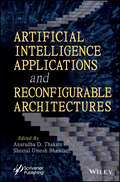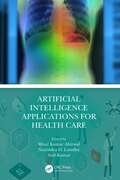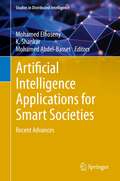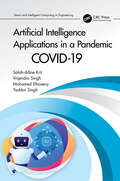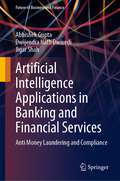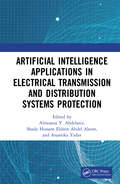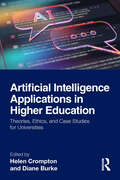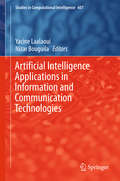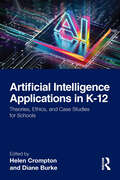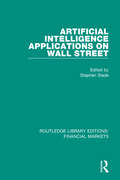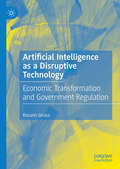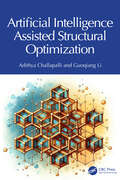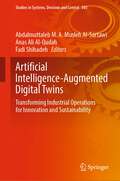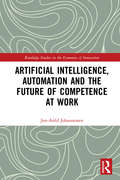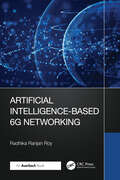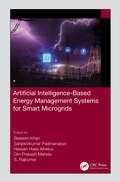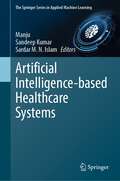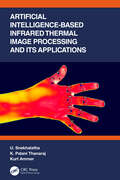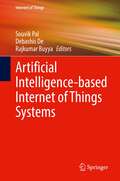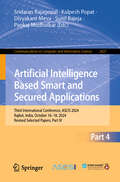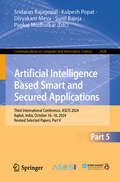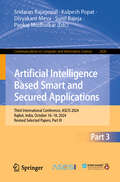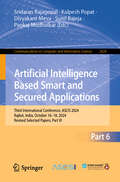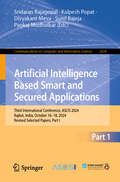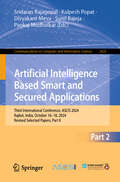- Table View
- List View
Artificial Intelligence Applications and Reconfigurable Architectures
by Anuradha D. Thakare Sheetal Umesh BhandariARTIFICIAL INTELLIGENCE APPLICATIONS and RECONFIGURABLE ARCHITECTURES The primary goal of this book is to present the design, implementation, and performance issues of AI applications and the suitability of the FPGA platform. This book covers the features of modern Field Programmable Gate Arrays (FPGA) devices, design techniques, and successful implementations pertaining to AI applications. It describes various hardware options available for AI applications, key advantages of FPGAs, and contemporary FPGA ICs with software support. The focus is on exploiting parallelism offered by FPGA to meet heavy computation requirements of AI as complete hardware implementation or customized hardware accelerators. This is a comprehensive textbook on the subject covering a broad array of topics like technological platforms for the implementation of AI, capabilities of FPGA, suppliers’ software tools and hardware boards, and discussion of implementations done by researchers to encourage the AI community to use and experiment with FPGA. Readers will benefit from reading this book because It serves all levels of students and researcher’s as it deals with the basics and minute details of Ecosystem Development Requirements for Intelligent applications with reconfigurable architectures whereas current competitors’ books are more suitable for understanding only reconfigurable architectures. It focuses on all aspects of machine learning accelerators for the design and development of intelligent applications and not on a single perspective such as only on reconfigurable architectures for IoT applications. It is the best solution for researchers to understand how to design and develop various AI, deep learning, and machine learning applications on the FPGA platform. It is the best solution for all types of learners to get complete knowledge of why reconfigurable architectures are important for implementing AI-ML applications with heavy computations. Audience Researchers, industrial experts, scientists, and postgraduate students who are working in the fields of computer engineering, electronics, and electrical engineering, especially those specializing in VLSI and embedded systems, FPGA, artificial intelligence, Internet of Things, and related multidisciplinary projects.
Artificial Intelligence Applications for Health Care
by Mitul Kumar Ahirwal Narendra D. Londhe Anil KumarThis book takes an interdisciplinary approach by covering topics on health care and artificial intelligence. Data sets related to biomedical signals (ECG, EEG, EMG) and images (X-rays, MRI, CT) are explored, analyzed, and processed through different computation intelligence methods. Applications of computational intelligence techniques like artificial and deep neural networks, swarm optimization, expert systems, decision support systems, clustering, and classification techniques on medial datasets are explained. Survey of medical signals, medial images, and computation intelligence methods are also provided in this book. Key Features Covers computational Intelligence techniques like artificial neural networks, deep neural networks, and optimization algorithms for Healthcare systems Provides easy understanding for concepts like signal and image filtering techniques Includes discussion over data preprocessing and classification problems Details studies with medical signal (ECG, EEG, EMG) and image (X-ray, FMRI, CT) datasets Describes evolution parameters such as accuracy, precision, and recall etc. This book is aimed at researchers and graduate students in medical signal and image processing, machine and deep learning, and healthcare technologies.
Artificial Intelligence Applications for Smart Societies: Recent Advances (Studies in Distributed Intelligence)
by Mohamed Elhoseny K. Shankar Mohamed Abdel-BassetThis volume discusses recent advances in Artificial Intelligence (AI) applications in smart, internet-connected societies, highlighting three key focus areas. The first focus is on intelligent sensing applications. This section details the integration of Wireless Sensing Networks (WSN) and the use of intelligent platforms for WSN applications in urban infrastructures, and discusses AI techniques on hardware and software systems such as machine learning, pattern recognition, expert systems, neural networks, genetic algorithms, and intelligent control in transportation and communications systems. The second focus is on AI-based Internet of Things (IoT) systems, which addresses applications in traffic management, medical health, smart homes and energy. Readers will also learn about how AI can extract useful information from Big Data in IoT systems. The third focus is on crowdsourcing (CS) and computing for smart cities. this section discusses how CS via GPS devices, GIS tools, traffic cameras, smart cards, smart phones and road deceleration devices enables citizens to collect and share data to make cities smart, and how these data can be applied to address urban issues including pollution, traffic congestion, public safety and increased energy consumption. This book will of interest to academics, researchers and students studying AI, cloud computing, IoT and crowdsourcing in urban applications.
Artificial Intelligence Applications in a Pandemic: COVID-19 (Smart and Intelligent Computing in Engineering)
by Salah-Ddine KritCOVID-19, a novel coronavirus pandemic has disrupted our society in many ways. Digital healthcare innovations are required more than ever before as we come across myriad challenges during this pandemic. Scientists and developers are learning and finding a way to use artificial intelligence applications and natural language processing to comprehend and tackle this disease. AI technologies are playing an important role in the response to the COVID-19 pandemic. Experts are using all possible tools to study the virus, diagnose individuals, and analyze the public health impacts. This book is a collection of some of the leading efforts related to AI and COVID-19 focused on finding how AI can be helpful in monitoring the situation from early warnings, swift emergency responses, and critical decision-making. It discusses the use of machine learning and how it may help to reduce the impacts of this pandemic in conjunction with all other research and strategies going on. The book serves as a technical resource of data analytics and AI applications in tracking infectious diseases. It will serve academics, students, data scientists, medical practitioners, and anybody managing a global pandemic. Features: Directs the attention to the smart digital healthcare system in this COVID-19 pandemic. Simulates novel investigations and how they will be beneficial in understanding the pandemic. Presents the latest ideas developed for data scientists, doctors, engineers, and economists. Analyses the various issues related to computing, AI apps, big data analytic techniques, and predictive scientific skill gaps. Explains some interesting and diverse types of challenges and data-driven healthcare applications.
Artificial Intelligence Applications in Banking and Financial Services: Anti Money Laundering and Compliance (Future of Business and Finance)
by Abhishek Gupta Dwijendra Nath Dwivedi Jigar ShahThis book discusses all aspects of money laundering, starting from traditional approach to financial crimes to artificial intelligence-enabled solutions. It also discusses the regulators approach to curb financial crimes and how syndication among financial institutions can create a robust ecosystem for monitoring and managing financial crimes. It opens with an introduction to financial crimes for a financial institution, the context of financial crimes, and its various participants. Various types of money laundering, terrorist financing, and dealing with watch list entities are also part of the discussion. Through its twelve chapters, the book provides an overview of ways in which financial institutions deal with financial crimes; various IT solutions for monitoring and managing financial crimes; data organization and governance in the financial crimes context; machine learning and artificial intelligence (AI) in financial crimes; customer-level transaction monitoring system; machine learning-driven alert optimization; AML investigation; bias and ethical pitfalls in machine learning; and enterprise-level AI-driven Financial Crime Investigation (FCI) unit. There is also an Appendix which contains a detailed review of various data sciences approaches that are popular among practitioners.The book discusses each topic through real-life experiences. It also leverages the experience of Chief Compliance Officers of some large organizations to showcase real challenges that heads of large organizations face while dealing with this sensitive topic. It thus delivers a hands-on guide for setting up, managing, and transforming into a best-in-class financial crimes management unit. It is thus an invaluable resource for researchers, students, corporates, and industry watchers alike.
Artificial Intelligence Applications in Electrical Transmission and Distribution Systems Protection
by Almoataz Y. AbdelazizArtificial intelligence (AI) can successfully help in solving real-world problems in power transmission and distribution systems because AI-based schemes are fast, adaptive, and robust and are applicable without any knowledge of the system parameters. This book considers the application of AI methods for the protection of different types and topologies of transmission and distribution lines. It explains the latest pattern-recognition-based methods as applicable to detection, classification, and location of a fault in the transmission and distribution lines, and to manage smart power systems including all the pertinent aspects. FEATURES Provides essential insight on uses of different AI techniques for pattern recognition, classification, prediction, and estimation, exclusive to power system protection issues Presents an introduction to enhanced electricity system analysis using decision-making tools Covers AI applications in different protective relaying functions Discusses issues and challenges in the protection of transmission and distribution systems Includes a dedicated chapter on case studies and applications This book is aimed at graduate students, researchers, and professionals in electrical power system protection, stability, and smart grids.
Artificial Intelligence Applications in Higher Education: Theories, Ethics, and Case Studies for Universities
by Helen Crompton Diane BurkeArtificial Intelligence Applications in Higher Education offers direct examples of how artificial intelligence systems can be applied in today’s higher education contexts. As the use of AI rapidly advances within colleges and universities worldwide, there is a pressing need to showcase the challenges, opportunities, and ethical considerations that are inherent in deploying these advanced computational tools. This book highlights the multifaceted roles of AI across teaching and learning, institutional administration, student data management, and beyond. Its collected case studies furnish actionable insights into enhancing academic institutions and addressing diverse learning priorities, such as motivation, engagement, feedback, and achievement goals. This valuable reference for researchers, designers, administrators, teaching faculty, and graduate students across various university programs offers fresh perspectives on generative AI, adaptive learning, intelligent tutoring systems, chatbots, predictive technologies, remote learning, and more.
Artificial Intelligence Applications in Information and Communication Technologies (Studies in Computational Intelligence #607)
by Yacine Laalaoui Nizar BouguilaThis book presents various recent applications of Artificial Intelligence in Information and Communication Technologies such as Search and Optimization methods, Machine Learning, Data Representation and Ontologies, and Multi-agent Systems. The main aim of this book is to help Information and Communication Technologies (ICT) practitioners in managing efficiently their platforms using AI tools and methods and to provide them with sufficient Artificial Intelligence background to deal with real-life problems.
Artificial Intelligence Applications in K-12: Theories, Ethics, and Case Studies for Schools
by Helen Crompton Diane BurkeArtificial Intelligence Applications in K-12 offers authentic instances of how AI systems can be integrated into K-12 education today. As AI technologies rapidly evolve and become more accessible to primary, middle, and high schools worldwide, there is a pressing need for new demonstrations that highlight the challenges, opportunities, and ethical considerations associated with these powerful tools. This book explores the various roles of AI within pedagogy and assessment, school administration, student data management, and beyond. Its collected case studies present practical ideas for enhancing educational institutions and offer replicable approaches across a range of learning priorities, from fostering motivation and engagement to improving feedback and achieving educational goals. Researchers, faculty members of teacher and leadership preparation programs, curriculum and instruction specialists, school-based instructional designers, technology coaches, and other readers will gain fresh insights from diverse global perspectives on topics such as generative AI, adaptive learning, intelligent tutoring systems, chatbots, predictive technologies, facial recognition software, and more.
Artificial Intelligence Applications on Wall Street (Routledge Library Editions: Financial Markets #16)
by Stephen SladeOriginally published in 1996 as a special issue journal, Artificial Intelligence Applications on Wall Street, presents a series of articles derived from papers at the Third International Conference on Artificial Intelligence Applications on Wall Street. The volume addresses how Artificial Intelligence can be used to address the variety of issues in that arise in the world of investments, such as synthetic instruments, forecasting and surveillance. It examines the potential problems surrounding economic assumption of rationality in a global market, and how artificial intelligence can push the bounds of rationality.
Artificial Intelligence as a Disruptive Technology: Economic Transformation and Government Regulation
by Rosario GirasaArtificial intelligence (AI) is the latest technological evolution which is transforming the global economy and is a major part of the “Fourth Industrial Revolution.” This book covers the meaning, types, subfields and applications of AI, including U.S. governmental policies and regulations, ethical and privacy issues, particularly as they pertain and affect facial recognition programs and the Internet-of Things (IoT). There is a lengthy analysis of bias, AI’s effect on the current and future job market, and how AI precipitated fake news. In addition, the text covers basics of intellectual property rights and how AI will transform their protection. The author then moves on to explore international initiatives from the European Union, China’s New Generation Development Plan, other regional areas, and international conventions. The book concludes with a discussion of super intelligence and the question and applicability of consciousness in machines. The interdisciplinary scope of the text will appeal to any scholars, students and general readers interested in the effects of AI on our society, particularly in the fields of STS, economics, law and politics.
Artificial Intelligence Assisted Structural Optimization
by Adithya Challapalli Guoqiang LiArtificial Intelligence Assisted Structural Optimization explores the use of machine learning and correlation analysis within the forward design and inverse design frameworks to design and optimize lightweight load-bearing structures as well as mechanical metamaterials.Discussing both machine learning and design analysis in detail, this book enables readers to optimize their designs using a data-driven approach. This book discusses the basics of the materials utilized, for example, shape memory polymers, and the manufacturing approach employed, such as 3D or 4D printing. Additionally, the book discusses the use of forward design and inverse design frameworks to discover novel lattice unit cells and thin-walled cellular unit cells with enhanced mechanical and functional properties such as increased mechanical strength, heightened natural frequency, strengthened impact tolerance, and improved recovery stress. Inverse design methodologies using generative adversarial networks are proposed to further investigate and improve these structures. Detailed discussions on fingerprinting approaches, machine learning models, structure screening techniques, and typical Python codes are provided in the book.The book provides detailed guidance for both students and industry engineers to optimize their structural designs using machine learning.
Artificial Intelligence-Augmented Digital Twins: Transforming Industrial Operations for Innovation and Sustainability (Studies in Systems, Decision and Control #503)
by Abdalmuttaleb M. A. Musleh Al-Sartawi Anas Ali Al-Qudah Fadi ShihadehPresently, we stand on the threshold of a technological revolution that will drastically change the way we live, work, and communicate with each other. By the current rate, scope, and complexity, this transformation will be as fundamental for society as any other technological paradigm change from the past. The industries which are more susceptible to change are technologically oriented industries including banking, finance, accounting, and auditing. One of the technological concepts of the technological revolution is the concept of the digital twin.The application of digital twins and AI as paired with Internet of Things technologies makes it possible to solve ESG problems on a completely different level (Li, 2019) for accounting firms and financial institutions. These include recycling on demand, rational energy consumption, smart surveillance cameras for crime tracking, and smart branch parking solutions, monitoring the wear and tear and conditions of financial technology infrastructures.Moreover, numerous researchers and practitioners emphasize the significance of innovating sustainable business models and operations (Geissdoerfer et al., 2018). The digital twin will allow businesses and financial institutions to minimize costs, boost customer service, and find new ways to generate revenue. DTW is accessible now more than ever, and many reputable and innovative companies such as Tesla, Ericsson, and Siemens have adopted it with varying success.Therefore, this book examines the opportunities, challenges, and risks of artificial intelligence-augmented digital twins for financial operations, innovation, and sustainable development. It focuses on AI and digital twin technologies to furnish solutions for the current industrial revolution including the Metaverse. Henceforth, this book aims to encourage authors to submit multi-disciplinary chapters indicating the current scholarly challenges about the applications and potential of artificial intelligence and digital twins in accounting, finance, and banking.
Artificial Intelligence, Automation and the Future of Competence at Work (Routledge Studies in the Economics of Innovation)
by Jon-Arild JohannessenArtificial intelligence and the autonomous robots of the Fourth Industrial Revolution will render certain jobs and competences obsolete but will also create new roles, which in turn require new sets of skills. They will also transform how we produce, distribute and consume, as well as how we think. Rather than a linear understanding of evolutionary processes, we will develop a more interactive and circular interpretation. This book offers a unique and holistic perspective on the future of work in the context of industry 4.0. It discusses the globalization of capital markets, how artificial intelligence can help organizations to be more competitive and the new role of leadership in this technological landscape. The author argues that there are four categories of competences, which will be required in order to maintain the relevance of human skills and expertise in the innovation economy. The new jobs that come into being will lend themselves to a particular set of skills. General competences will be necessary for roles involving the 4Cs of communication, creativity, collaboration and change. Specific or STEM competences will be called for across the science, technology, engineering and mathematics sectors. Human competences will lend themselves to positions comprising the SELC framework of social, emotional, leadership and cultural skills. Critical or REVE competences will be in demand for roles embracing reflection, ethics, values and the environment. The book provides a human-centric view of the current technological advancements of artificial intelligence and robotics and offers a positive outlook for human actors seeking continued relevance. It will appeal to scholars and students of the innovation economy, the knowledge society and the coming Fourth Industrial Revolution.
Artificial Intelligence-Based 6G Networking
by Radhika Ranjan RoyArtificial Intelligence-Based 6G Networking focuses exclusively on the upcoming sixth-generation (6G) network and services slated for implementation by 2030. It explores the paradigm shift that is 6G. It discusses the deep integration of computing and communication, supported by artificial intelligence (AI) across network elements like cloud, edge, and terminals. It also examines how AI-native interfaces will permeate various network components, from radio access networks to application servers and databases.Proposing a unified AI-enabled framework for optimizing networks and applications as a single integrated system, the book covers how network service providers can tailor network baselines, reduce noise, and accurately identify issues. The book delves into the potential of AI-driven networks to self-correct, predict, and rectify service degradations proactively, enhancing uptime and troubleshooting efficiency. It outlines the “Connection, Communication, Collaboration, Curation, and Community” framework to enhance network effects, aiding operators in automation, cost reduction, and providing optimal user experiences.Covering topics from MIMO and Massive MIMO to holographic communications, cybersecurity and quantum communications, the book explores cutting-edge technologies shaping the future of 6G networks. It anticipates a future where AI, along with machine learning and deep learning, enables continuous learning, self-optimization, and predictive maintenance, even with full automation, that will be the hallmark of a new era in network connectivity and innovation.
Artificial Intelligence-Based Energy Management Systems for Smart Microgrids
by Baseem KhanModeling and optimization of energy management systems for micro- and mini-grids play an important role in the fields of energy generation dispatch, system operation, protection coordination, power quality issues, and peak demand conflict with grid security. This comprehensive reference text provides an in-depth insight into these topics. This text discusses the use of meta-heuristic and artificial intelligence algorithms for developing energy management systems with energy use prediction for mini- and microgrid systems. It covers important concepts including modeling of microgrid and energy management systems, optimal protection coordination-based microgrid energy management, optimal energy dispatch with energy management systems, and peak demand management with energy management systems. Key Features: Presents a comprehensive discussion of mini- and microgrid concepts Discusses AC and DC microgrid modeling in detail Covers optimization of mini- and microgrid systems using AI and meta-heuristic techniques Provides MATLAB®-based simulations on a mini- and microgrid Comprehensively discussing concepts of microgrids with the help of software-based simulations, this text will be useful as a reference text for graduate students and professionals in the fields of electrical engineering, electronics and communication engineering, renewable energy, and clean technology.
Artificial Intelligence-based Healthcare Systems (The Springer Series in Applied Machine Learning)
by Manju Sandeep Kumar Sardar M. N. IslamThis book explores new applications in the field of science and technology for healthcare systems. The main focus of this book is to devise smart, efficient and robust solutions for the health care sector to serve the major population of rural areas. Artificial Intelligence-based Healthcare Systems encourages scientists, engineers, and scholars across the multiple disciplines to design smart intelligent innovations on rural healthcare issues and motivate to collaborate multiple ideas to design best solutions. It also helps the readers at various levels of knowledge to further enhance their understanding for new tools and smart solutions.
Artificial Intelligence-based Infrared Thermal Image Processing and its Applications
by U. Snekhalatha K. Palani Thanaraj Kurt AmmerInfrared thermography is a fast and non-invasive technology that provides a map of the temperature distribution on the body’s surface. This book provides a description of designing and developing a computer-assisted diagnosis (CAD) system based on thermography for diagnosing such common ailments as rheumatoid arthritis (RA), diabetes complications, and fever. It also introduces applications of machine-learning and deep-learning methods in the development of CAD systems. Key Features: • Covers applications of various image processing techniques in thermal imaging applications for the diagnosis of different medical conditions • Describes the development of a computer diagnostics system (CAD) based on thermographic data • Discusses deep-learning models for accurate diagnosis of various diseases • Includes new aspects in rheumatoid arthritis and diabetes research using advanced analytical tools • Reviews application of feature fusion algorithms and feature reduction algorithms for accurate classification of images This book is aimed at researchers and graduate students in biomedical engineering, medicine, image processing, and CAD.
Artificial Intelligence-based Internet of Things Systems (Internet of Things)
by Debashis De Rajkumar Buyya Souvik PalThe book discusses the evolution of future generation technologies through Internet of Things (IoT) in the scope of Artificial Intelligence (AI). The main focus of this volume is to bring all the related technologies in a single platform, so that undergraduate and postgraduate students, researchers, academicians, and industry people can easily understand the AI algorithms, machine learning algorithms, and learning analytics in IoT-enabled technologies. This book uses data and network engineering and intelligent decision support system-by-design principles to design a reliable AI-enabled IoT ecosystem and to implement cyber-physical pervasive infrastructure solutions. This book brings together some of the top IoT-enabled AI experts throughout the world who contribute their knowledge regarding different IoT-based technology aspects.
Artificial Intelligence Based Smart and Secured Applications: Third International Conference, ASCIS 2024, Rajkot, India, October 16–18, 2024, Revised Selected Papers, Part IV (Communications in Computer and Information Science #2427)
by Sridaran Rajagopal Kalpesh Popat Divyakant Meva Sunil Bajeja Pankaj MudholkarThe six-volume set, CCIS 2424 - 2429, constitutes the refereed proceedings of the Third International Conference on Advances in Smart Computing and Information Security, ASCIS 2024, held in Rajkot, Gujarat, India, in October 16–18, 2024. The 138 full papers and 43 short papers presented in these six volumes were carefully reviewed and selected from 667 submissions.The papers presented in these six volumes are organized in the following topical sections: Part I, II, III, IV: Artificial Intelligence & Machine Learning Part V: Smart Computing; Network and Cloud Computing. Part VI: Cyber Security; Computer Application for Sustainability.
Artificial Intelligence Based Smart and Secured Applications: Third International Conference, ASCIS 2024, Rajkot, India, October 16–18, 2024, Revised Selected Papers, Part V (Communications in Computer and Information Science #2428)
by Sridaran Rajagopal Kalpesh Popat Divyakant Meva Sunil Bajeja Pankaj MudholkarThe six-volume set, CCIS 2424 - 2429, constitutes the refereed proceedings of the Third International Conference on Advances in Smart Computing and Information Security, ASCIS 2024, held in Rajkot, Gujarat, India, in October 16–18, 2024. The 138 full papers and 43 short papers presented in these six volumes were carefully reviewed and selected from 667 submissions.The papers presented in these six volumes are organized in the following topical sections: Part I, II, III, IV: Artificial Intelligence & Machine Learning Part V: Smart Computing; Network and Cloud Computing. Part VI: Cyber Security; Computer Application for Sustainability.
Artificial Intelligence Based Smart and Secured Applications: Third International Conference, ASCIS 2024, Rajkot, India, October 16–18, 2024, Revised Selected Papers, Part III (Communications in Computer and Information Science #2426)
by Sridaran Rajagopal Kalpesh Popat Divyakant Meva Sunil Bajeja Pankaj MudholkarThe six-volume set, CCIS 2424 - 2429, constitutes the refereed proceedings of the Third International Conference on Advances in Smart Computing and Information Security, ASCIS 2024, held in Rajkot, Gujarat, India, in October 16–18, 2024. The 138 full papers and 43 short papers presented in these six volumes were carefully reviewed and selected from 667 submissions.The papers presented in these six volumes are organized in the following topical sections: Part I, II, III, IV: Artificial Intelligence & Machine Learning Part V: Smart Computing; Network and Cloud Computing. Part VI: Cyber Security; Computer Application for Sustainability.
Artificial Intelligence Based Smart and Secured Applications: Third International Conference, ASCIS 2024, Rajkot, India, October 16–18, 2024, Revised Selected Papers, Part VI (Communications in Computer and Information Science #2429)
by Sridaran Rajagopal Kalpesh Popat Divyakant Meva Sunil Bajeja Pankaj MudholkarThe six-volume set, CCIS 2424 - 2429, constitutes the refereed proceedings of the Third International Conference on Advances in Smart Computing and Information Security, ASCIS 2024, held in Rajkot, Gujarat, India, in October 16–18, 2024. The 138 full papers and 43 short papers presented in these six volumes were carefully reviewed and selected from 667 submissions.The papers presented in these six volumes are organized in the following topical sections: Part I, II, III, IV: Artificial Intelligence & Machine Learning Part V: Smart Computing; Network and Cloud Computing. Part VI: Cyber Security; Computer Application for Sustainability.
Artificial Intelligence Based Smart and Secured Applications: Third International Conference, ASCIS 2024, Rajkot, India, October 16–18, 2024, Revised Selected Papers, Part I (Communications in Computer and Information Science #2424)
by Sridaran Rajagopal Kalpesh Popat Divyakant Meva Sunil Bajeja Pankaj MudholkarThe six-volume set, CCIS 2424 - 2429, constitutes the refereed proceedings of the Third International Conference on Advances in Smart Computing and Information Security, ASCIS 2024, held in Rajkot, Gujarat, India, in October 16–18, 2024. The 138 full papers and 43 short papers presented in these six volumes were carefully reviewed and selected from 667 submissions.The papers presented in these six volumes are organized in the following topical sections: Part I, II, III, IV: Artificial Intelligence & Machine Learning Part V: Smart Computing; Network and Cloud Computing. Part VI: Cyber Security; Computer Application for Sustainability.
Artificial Intelligence Based Smart and Secured Applications: Third International Conference, ASCIS 2024, Rajkot, India, October 16–18, 2024, Revised Selected Papers, Part II (Communications in Computer and Information Science #2425)
by Sridaran Rajagopal Kalpesh Popat Divyakant Meva Sunil Bajeja Pankaj MudholkarThe six-volume set, CCIS 2424 - 2429, constitutes the refereed proceedings of the Third International Conference on Advances in Smart Computing and Information Security, ASCIS 2024, held in Rajkot, Gujarat, India, in October 16–18, 2024. The 138 full papers and 43 short papers presented in these six volumes were carefully reviewed and selected from 667 submissions.The papers presented in these six volumes are organized in the following topical sections: Part I, II, III, IV: Artificial Intelligence & Machine Learning Part V: Smart Computing; Network and Cloud Computing. Part VI: Cyber Security; Computer Application for Sustainability.
